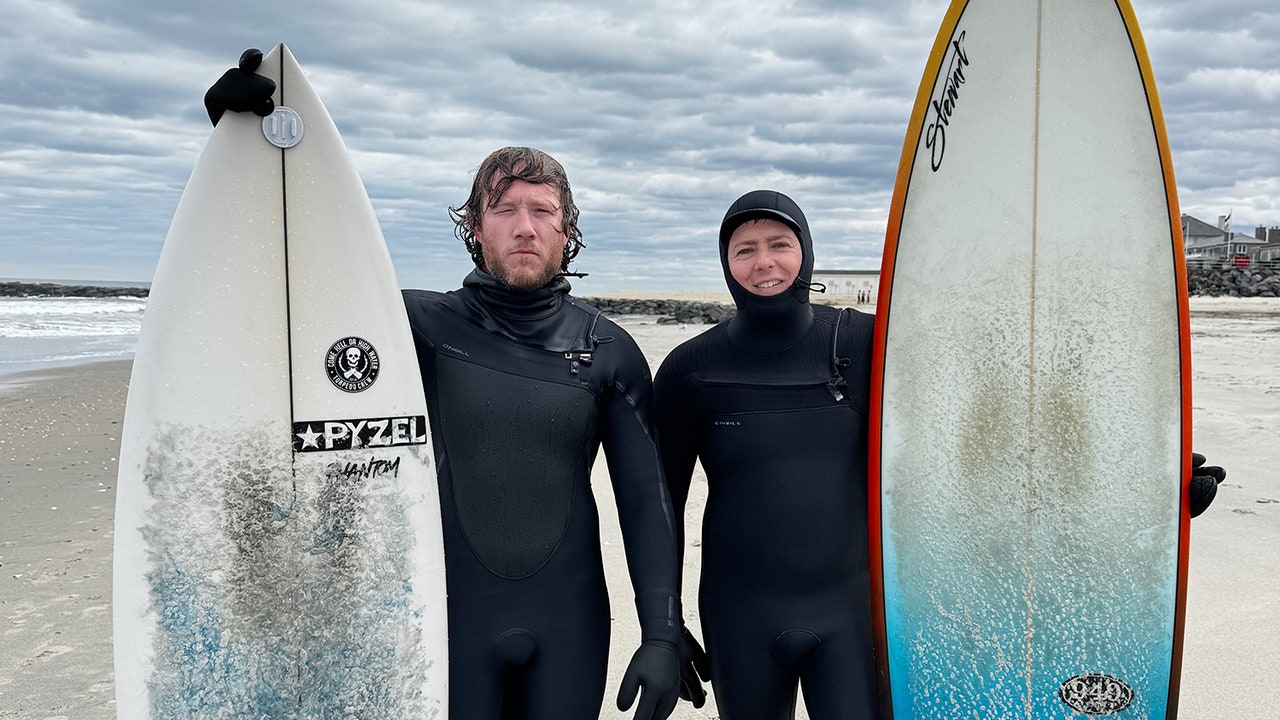It was the year’s hottest day yet. The rest of the East Coast was clamoring to go to the beach. And yet David Litt stored his surfboard and went into a Manhattan office building to talk about his new book. “I’m looking at the temperature here, and the waves in Jersey, and questioning my life choices,” Litt says. “As per usual.” Litt is joking, but also not. One morning in early 2022, the former speechwriter for President Barack Obama stood on a set of railroad tracks, looking at an oncoming train. Fortunately, Litt walked away, got therapy, and, perhaps most importantly, took up surfing. It’s Only Drowning is a memoir not just of his emotional journey, but of a political education different from what he learned at Yale and the White House.
After a series of bruising and not terribly helpful introductory surfing lessons, Litt warily paddles out into the waves with Matt Kappler, his electrician brother-in-law. Kappler isn’t simply a skilled, seemingly fearless surfer; he’s a tattooed lover of death metal and Joe Rogan. Litt prefers Lizzo and NPR. The odd couple ends up making trips from Asbury Park to Spain, France, Hawaii, and an artificial wave pool in Texas; Litt learns how to navigate the legendary Sunset Beach breaks on his board and also how to listen to his MAGA-adjacent sort-of companion.
From these entwined physical and intellectual journeys, the 38-year-old Litt has developed a few theories about how the Democrats can rebound—including that the party’s leaders need more hobbies. “Democratic candidates shouldn’t be afraid to talk about the less-than-serious parts of their lives,” Litt says, “even at a moment of deep seriousness in the world.”
Vanity Fair: Congratulations on having written a funny and poignant book. More importantly, I’m glad you are now in a better place emotionally.
David Litt: Thanks. I didn’t want the book to just be about falling off surfboards, although there’s plenty of that. This was really about hitting a moment that I think, frankly, a lot of millennials hit, which is the sense of, the world we were promised is not the world that we are getting, and time is ticking. It’s really challenging to figure out our place in that world. And this book, to a large extent, is about me trying to do that. I thought about sort of glossing over the part about depression. But I like books that make you feel less alone, especially in challenging moments, which we’ve been living through a lot of lately.
Your background in politics would probably have figured into the story anyway, but it takes on a much deeper dimension when your brother-in-law becomes a major part of the narrative.
Originally, I had thought the parts with Matt would be more comic relief. What changed was that what actually brought me out of the depression and made me feel like a surfer—not just on a board, but in a bigger and broader sense—all involves Matt. I learned so much from him. And the biggest thing I learned from him was courage.
You have described your book as “Hillbilly Elegy for people who hate JD Vance.” What do you mean?
We’ve seen this play out in Vance’s political career—it’s ultimately about trying to say one group of people deserves to be understood, but the other group deserves to feel bad for not understanding them. It’s another way of trying to divide quote, unquote, real America from quote, unquote, elite America. I think what really matters is, we understand each other. The whole point of America is to say, Hey, we’re all in this together. We don’t necessarily have to get along. But we are in this together.
I started the book thinking, Okay, this has nothing to do with politics. I’m a surfer now, I’m gonna grow my hair long. And then I found myself in the middle of this divide between college-educated men like me and guys like Matt who work with their hands. That divide was defining our country and our politics during the run-up to the 2024 election.
Your personal story makes for an intriguing and heartening narrative. But are there insights you think apply more widely and politically?
A lot of people assume that the “manosphere” is all in on war with Iran. And I know from spending time not just with Matt, but with other surfers, that at the heart of the manosphere is the idea that you’re self-sufficient. And that no one’s telling you what to do. Being dragged into another Middle Eastern war by the government is exactly the definition of someone telling you what to do. So I think most of MAGA will go along with whatever [Donald] Trump decides with Iran, but there is this pretty crucial slice of his coalition—and this might seem counterintuitive, because it’s a bunch of guys who really love, like, Ultimate Fighting—he might actually lose over this.
In the book you spend far more time trying to analyze how Matt thinks than he spends thinking about you. Which struck me as fitting perfectly with the political moment: Democrats care way more about figuring out MAGA and the working class than they care about us.
I think if you ask working-class people, they actually have the opposite view. They say, Wait a second, it feels like elites don’t think about us at all. What is interesting about Trump and Trumpism is he is one of the only politicians where they would say, Hey, at least he’s listening to me. Some of this is pandering, but at least he panders, right? Working-class America feels that elite America isn’t thinking about them at all, except for when it comes time to say, Hey, can we get some votes? And that’s not working.
